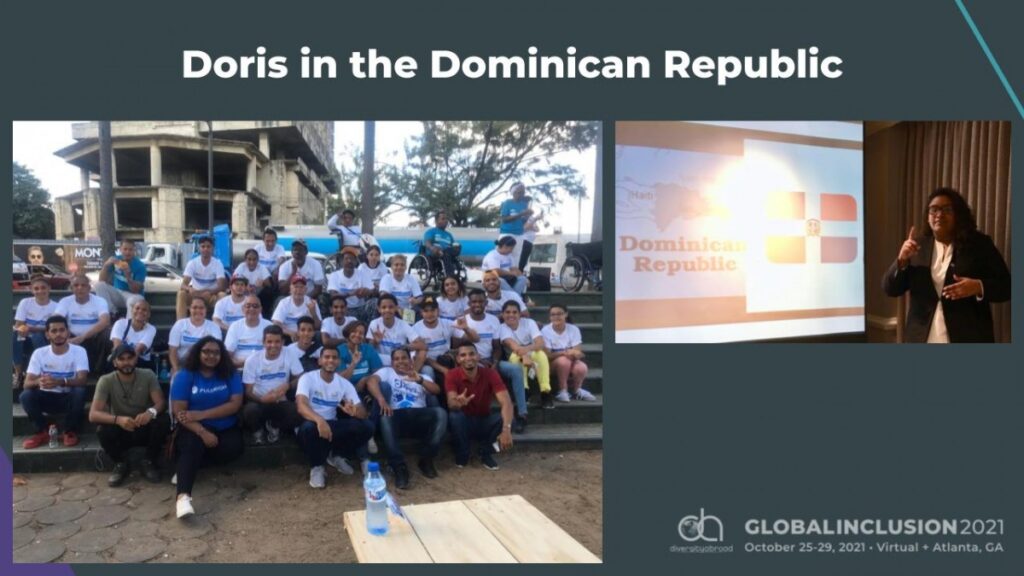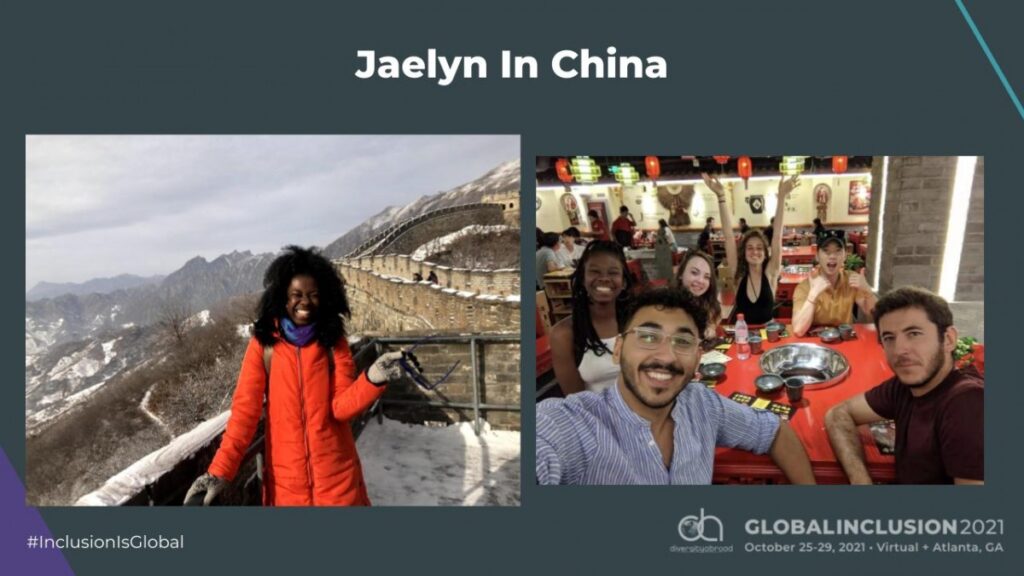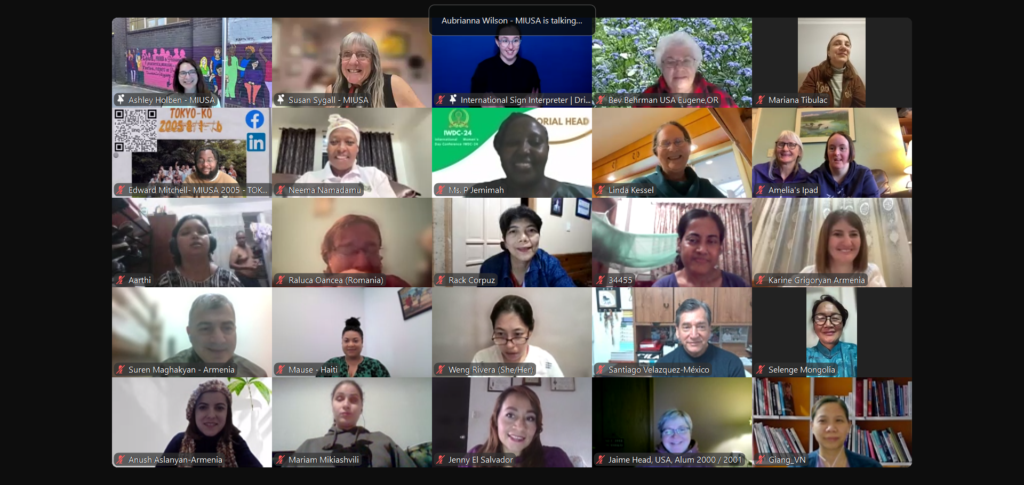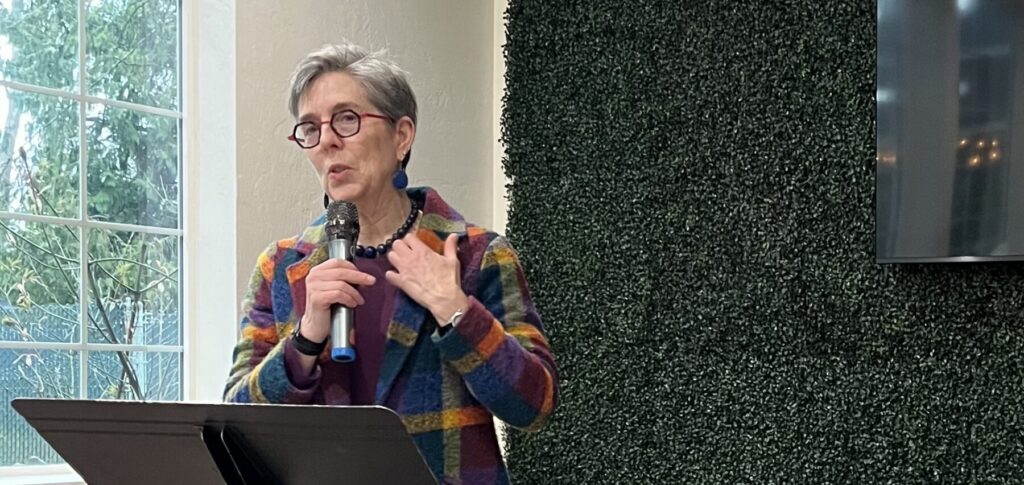In recent years, we at the National Clearinghouse on Disability and Exchange have been taking a closer look at how disability intersects with other identities in the context of international exchange experiences.
So when NCDE presented on “Exploring Identity Abroad: Perspectives From International Exchange Alumni with Disabilities” at Diversity Abroad’s 2021 Global Inclusion conference, it wasn’t the first time we explored questions about how our identities – disability identity, but also race, ethnicity, socioeconomic status, nationality, and more – influence people’s decisions about whether to go abroad, where to go abroad, and what type of international exchange program to pursue. How our identities factor into the interactions we have while abroad, with members of the host community or fellow travelers. Whether we perceive our own identities differently as a result of going abroad.No, presenting at Global Inclusion wasn’t the first time we explored these questions. And yet, as my co-presenter and NCDE colleague Johileny Merán pointed out, no matter how often we explore these questions, each discussion sheds light on something new!Johileny and I were joined by guest presenters Doris Alcántara and Jaelyn Evans, who graciously accepted our invitation to share about their personal experiences as international exchange alumni:
- As a Chinese Studies minor, Jaelyn spent the Fall 2019 semester studying in Beijing, China on a very intensive, immersive Chinese language study program. Between classes, she had the opportunity to explore around Beijing.
- In 2018, Doris traveled to the Dominican Republic with support from the Benjamin A. Gilman Scholarship*. Later she went back to the Dominican Republic on a Fulbright Program* grant to research the status of Deaf education within the Dominican Republic.
Below are a few excerpts from our conversation with Doris and Jaelyn that were particularly illuminating!
Doris: My topic of research is very closely related to my identity. I struggled within the education system growing up as a Deaf/hard of hearing individual, and I did not receive many of the accommodations I needed in school. I graduated high school with a low GPA as a result of that. When I got to college [at Gallaudet University, the only 4-year university for Deaf and hard of hearing students in the world], I finally got access to the resources I needed, had the opportunity to learn American Sign Language, and I really thrived academically and increased my GPA quite a lot. That whole experience made me think about how access to sign language and education helped the Deaf community develop. I chose the Dominican Republic because my dad was born there. I’m half Dominican. So this was an opportunity to get more connected with my roots, and in a way, give back to my community.
Jaelyn: I’ve been studying Chinese since 7th grade. The high school I attended was a primarily black high school, and they wanted to equip us to go into the world and have a good job. The language choices were Chinese or Arabic, and I chose Chinese. I then transferred high schools, and I had to pick up German instead. But when I got to college, we had a whole Chinese program here, so I said “of course I’ll get back into this.” It’s funny. My Chinese professor told me that there is a program I could apply for over the summer in the following school year, because the application was due within 24 hours of receiving it. I told my mother that I was thinking of applying for it next year, and she said, “well, why not now?!” So I applied, but I guess there wasn’t as much forethought. But after I received it, I did a lot more research to prepare myself for what to expect when I went abroad.
Jaelyn: The preparation I did was better than none. I’m glad I did something. I memorized the map of the school. I planned my route from the airport to the college. But the aspects of culture shock is something you can’t prepare for. I’m originally from Chicago, a super diverse city where I’m used to seeing people who look like me and people who don’t look like me. And then I went to Beijing, which is very much still a homogenous place, it was vastly disorienting. And of course you have the language aspect. I knew Chinese going into it luckily, so it wasn’t as bad as it was for some of my peers, but it’s still odd to grow up in America, hearing your native language spoken around you, and then going to a brand new place where they don’t use English. So if you don’t know Chinese, you’re kind of stranded. But it makes for very good language-learning!
Jaelyn: I have ADHD and anxiety. So a lot of the preparation I did was to ease some of my anxiety going into it. It helps some, but going to a brand new place, anyone is bound to be nervous. While I was there, I learned a lot about myself as a person with ADHD and anxiety. There were some things I couldn’t do, I didn’t have the “spoons” for it.
There were many opportunities I had to turn down. In the moment, I felt bad not going out with my friends or skipping some assignments because I needed a mental health day. But in the end, it taught me about myself, my resilience. I know myself the best, so I need to put myself best. I still had a really great time.
Jaelyn: In my preparation, I read a lot of stories from other black people who traveled abroad to Bejing and China. There were some things I was reading that I didn’t believe. No one is going to walk up to me and touch my hair and take pictures. But when I got there, that’s what happened! But it was good to have read about that in advance. In America, if this were to happen, it would be seen as problematic and racist. But in China, it’s coming from a place of curiosity. It’s very much a homogenous culture, and most people haven’t seen people who look like me, who have big fluffy hair – I had my hair OUT – who are as dark as me. That helped me to quell the initial anger and outrage I felt. I put myself in their shoes. If I saw people who looked vastly different from myself, I might take pictures too.
Doris: Walking around in the community, I looked like the people around me. So I felt pretty comfortable. I wasn’t necessarily different from the people I saw on a daily basis. But when it came to my work, and when I was conducting my research and people found out I had graduated from college and was conducting research, many people were surprised by that. People expected that my role was lesser than. They didn’t expect much of me as a Deaf individual. When they discovered that I had graduated college or other accomplishments, it was a shock to them.
My American-ness led local people to assume I had a certain amount of privilege. Some of those privileges I definitely did have, but others I didn’t. So it was an interesting process trying to describe who I was and my experience as a black disabled woman in the U.S., and how that impacted my decision to go to the Dominican Republic and advocate and support the Deaf community there.
Jaelyn: My best friend is also black and has ADHD, so she was definitely my rock when I was in China. Even with the 12-hour time difference, we spoke every single day. It was so amazing to have somebody who has lived a similar life to mine who I could tell “I’ve had a very bad day,” and she knew exactly what I meant. I was also lucky to have people there in China. It was funny because our cohort is made up of people from all over the world so some of my closest friends are from Spain and South Korea, and we were speaking together in Chinese. One of them had disabilities. But it was nice at the end of the day to go back to my friend at home and talk to her about some things they wouldn’t understand.
I also connected with a large number of Instagram groups like the Fulbright Noir group [for black Fulbright grantees], and recently there was a Fulbright Access group created for Fulbrighters with disabilities, but that wasn’t set up at the time I went abroad. So, those groups were extremely helpful. It was a place where we were able to express and share our experiences and connect based on our similar background and recognize how these identities impacted our experiences abroad.
Doris: During my time in the Dominican Republic, I felt more and more close to the Deaf community there. And they were able to explain what was normal in that setting. For example, how people in the area viewed Deaf people and the expectations of them and the way that they interact with them. At the same time, I did have community here in America that I needed to reach out to because they were able to understand all of the context that I was used to, the resources that we had available but going to the DR and realizing that there were a lot more limitations there that I wasn’t used to. These things were often normal for the community in the Dominican Republic so it did help me understand what was normal in that context and helped me realize how I could cope with those limitations while there and, so, having community in both areas helped me with that process.
Doris: My Gilman follow-up project was related to supporting people within their application process and focusing on supporting minority groups abroad. Because I felt like sharing my story would help people because there may be several people who feel like me, because I don’t have income, I don’t have access to this type opportunity or those are the things, and, so, I definitely wanted to share my own personal experience to show them it was possible and encourage them to take advantage of the abroad opportunities.
Jaelyn: Since I’ve gone back to campus, I’ve been in conversation with my diversity office. We are putting out resources in regards to students with disabilities who wants to go abroad because as we mentioned, it seemed so daunting to try to do and if the support is not there. It might not happen. So I was trying to help them build those resources and share them with our community so people know that you can go abroad, disability or not.
Jaelyn: I wish they had been in closer contact with the school in China just because my going there and then coming back because I technically transferred there and I ended up transferring back due to the COVID pandemic, I couldn’t return to China once I came back to America, so I transferred back to my original institution, that was difficult and I ended up not receiving any college credits for the time I spent in China, that was super stressful how I’m supposed to now graduate in seven semester instead of eight, I’m doing it, but making sure there’s a close communication between the student, host and home institutions to alleviate a lot of the stress off the student, one less thing to worry about.
Doris: One thing that I wish my university would have prepared better for was cultural competency and usually deaf people from Gallaudet university, we are inclined to want to help other people in other deaf communities but it’s important first to understand the culture that you are trying to support and understand the intersection of culture and disability and how that impacts the experience of these communities in their respective countries. So, the importance of being culturally aware and making sure to exercise that cultural competency is something that I wish my university would have prepared better for.
Doris: One thing that I think many programs tend to forget is the importance of listening to the community that you want to learn about and emphasizing that. So, giving people the power to share their experience, the people who are from that community. And I feel like sometimes we spend too much time guessing about the communities that we will be involving ourselves in, making assumptions but really you can ask, you can engage those people directly and get their perspective directly from them.
Jaelyn: When designing programs, don’t make it super jam-packed all the time. Like I discussed earlier, it’s just people, especially with non-visible disabilities, you may not necessarily think about it, but there are going to be some days that are just no, also thinking if somebody doesn’t show up, if they need to stay at the — we need to see how we can support them.
Jaelyn: I just put in my application for the Congress-Bundestag Youth Exchange*! It’s a program that allows students from America to study in Germany and students from Germany to study in America. I want to spend my gap year studying abroad in Germany learning German and doing something related to politics or policy.
Learning from my experiences in China, I think I will be a lot nicer to myself this time. When I was in China, I felt like I was trying to push myself to be everything and be everywhere and do everything. So maybe I’ll take breaks in the beginning, I’ll be more mellow, take advantage of everything I can within reason and learn to strike that balance. I’m not there even now but I think it will be a good exercise in balancing work and life, and I think something that will help me in my future in general.
Doris: I really want to go back to Latin America, and I want to see other countries, recognizing and researching how they incorporate sign language into education. And I really want to see the development of Deaf education in Latin America. I’m wondering how these various countries could depend on each other and support each other through this process.
I do think my identity will impact my future travels as well. Something I often think about when I interact with people is what do I want from my conversation with them? Do I want to educate? Do I want to learn something from them? So this is something that I think will help me have more impactful conversation with the people I interact with and recognize also how, you know, conversation can often be seen like a mundane thing, but one conversation could really create change.

Doris: In the first photo, that was from a parade that took place when a group of disabled individuals were marching in support of breaking barriers. And, so, that group was the Deaf group that I was with from can’t I ago oh and we went to the capital. And it was just nice to see such a large group of disabled folks coming together, fighting for our different needs but at the same time we were in support of the same goal which is independence.
The second photo was my presentation at the international education week conference. This photo was really important to me because this was focused on how more people need to reclaim their right to research their own communities and support their own communities in doing so because often their perspectives aren’t included in this research. So this was arguing for the importance of including those perspectives and the research itself is important, because this supports a lot of the policies that get passed and the politics that develop within these communities.

Jaelyn: I will start with the picture on the left. That is me at the Great Wall of China on Christmas. Technically we had classes on Christmas. I wanted to go, as the semester was almost over, and so me and my other fellow American friends thought, what better time to go see the Great Wall than when it’s covered in snow? You can see the snow-capped mountains, it was great. I fell from the ice, but I had a fluffy coat, so it didn’t hurt.
On the right-hand side this is the group of people I mentioned, my group of friends when I was in China from all over the world. Our first weekend in China, we were at a hot pot restaurant so it was like our first time doing something really out and about in China. We were super nervous because all our Chinese was bad. We spent 20 minutes trying to order food from the waiter. I’m not sure what we ordered, but it was good! These are two of the really big highlights of my time in China, so the beginning and the end.
*The Benjamin A. Gilman Scholarship, Fulbright Program, and Congress-Bundestag Youth Exchange programs are sponsored by the U.S. Department of State’s Bureau of Educational and Cultural Affairs.
Sign up for our E-News






Manage Your Privacy